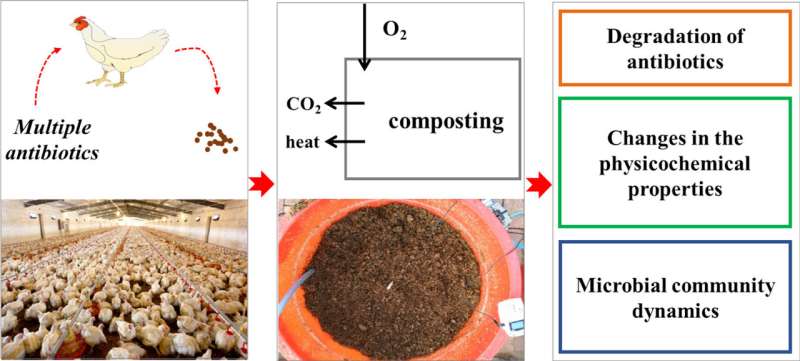Transfer and transformation of heavy metals and antibiotics during broiler breeding-manure-composting

The substitution of organic fertilizer is the core of "chemical fertilizer reduction" in agriculture, while heavy metals and antibiotics in organic fertilizer are unavoidable environmental risk factors. Intensive farming is the main source of organic fertilizer, but heavy metals and antibiotics enter agro-ecosystem through feed feeding and inoculation and prevention.
Clarifying the transfer efficiency and emission rules of heavy metals and antibiotics in the process of livestock breeding, excrement and composting, not only contributes to promoting the development of the diversity of traditional agricultural ecology, but also providing scientific basis for ecological environmental risk analysis in the process of substituting organic fertilizer for chemical fertilizer.
In view of this, a research team led by Chen Xin from the Institute of Applied Ecology of the Chinese Academy of Sciences has recently examined the accumulation of metal elements and the fate and depletion of Doxycycline and Gatifloxacin during the composting process of broiler manure.
The researchers found that the feed of intensive broiler fully conforms to the national health standard (GB13078-2017), as well as under the heavy metal content in the current feed standard, the total amount of heavy metals in manure produced by intensive broiler farming after aerobic composting conforms to the standard of organic fertilizer in China (NY 525-2021). However, the concentration of Zn exceeds the ecological standard limits of heavy metals in fertilizers established by the European Union and Australia.
In addition, aerobic composting can reduce the bioavailability of heavy metals (Zn, Cu, Pb and Ni) in manure. The two antibiotics changed quite differently during aerobic composting. About 14.96–15.84% of Doxycycline still remained at the end of composting, while Gatifloxacin was almost completely removed within 10 days of composting.
According to the researchers, Doxycycline and Gatifloxacin residuals in broiler manure had significant effects on the physicochemical parameters and bacterial community structure during the early stage of composting. The combination of multiple antibiotics leaded to a delayed increase of temperature and pH and a slow break down of nitrogen. Although these effects decreased gradually with the degradation of antibiotics, dominant bacteria that were involved in the composting process such as Actinobacteriota and Bacteroidota were still influenced by multiple antibiotic residuals until the end of composting period. Higher levels of antibiotics were associated with longer effects on bacterial community.
The same effects, however, were not so obvious for fungi (i.e., the combination of these two antibiotics did not significantly promote or inhibit the succession of fungal community structure). Rather, high concentrations of Doxycycline and Gatifloxacin during composting increased species richness.
This study was published in Science of the Total Environment, titled "Effects of multiple antibiotics residues in broiler manure on composting process."
More information: Yongcui Wang et al, Effects of multiple antibiotics residues in broiler manure on composting process, Science of The Total Environment (2022). DOI: 10.1016/j.scitotenv.2021.152808
Journal information: Science of the Total Environment
Provided by Chinese Academy of Sciences





















